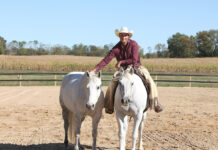Pasture-kept horses have the ability to interact socially and are exposed to a rich environment, but have less contact with humans than their stall-kept counterparts. A 1997 study* has found that in spite of decreased human intervention, young pasture horses might be easier to train than those kept in stalls. In the Michigan State University study, 16 2-year-old Arabian horses were started in training: half were kept in pasture during the study, the other half were stalled.
* Behavioral And Physiological Responses Of Horses To Initial Training: The Comparison Between Pasture Versus Stalled Horses, E. Rivera; S. Benjamin; A. Morrison; L. Callender; B.D. Nielsen; A.J. Zanella







I believe that pasture kept horses are best for both you and your horse. My horse is pasture kept he has no bad habits and is much more relaxed when I ride him. A stall kept horse can pick up vices such as cribbing, and pacing these are the result of bordom. A pasture kept horse has the option of running, playing, and foraging keeping them active, healthy and clean of unwanted habits.
Interesting! I think the best solution is to keep your horse both in the pasture and in a stall!
I think that is a great artical!
I think this is great! I have always believed that keeping your horse as natural as possible (no shoes, clipping, blankets or stalls) was best, and this supports that even more! Perhaps that is why my little filly has progressed so much even though I only get to see her maybe once or twice a week most of the time.
Makes sense.